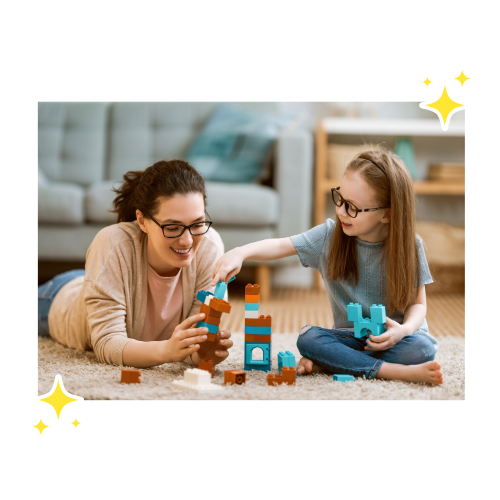Summer is a beautiful season filled with sunshine, laughter, and endless opportunities to make memories. But without the structure of the school year, it can also feel a bit unsteady—especially for families with young children.
Creating a thoughtful and flexible summer routine can make a world of difference. When done with care, it brings rhythm to the day, reduces stress, and helps children feel safe, engaged, and joyful. For nannies, it provides structure and confidence to carry out their day with intention and love.
Here’s how to design a summer routine that truly works—for kids, for nannies, and for families.
1. Begin with a Conversation
The foundation of any great routine is collaboration. Before summer begins, parents and nannies should set aside time to discuss what a successful summer looks like.
Together, consider:
- What are the family’s priorities this summer? (Relaxation? Skill-building? Connection?)
- Are there milestones or learning goals to support?
- Are there any camps, vacations, or scheduled appointments to factor in?
Involve the children in simple ways too! Let them share what they’d like to do or learn—it gives them a sense of voice and excitement.
Pro Tip: Write down a few key summer goals and revisit them mid-season to reflect and adjust.
2. Build a Predictable, Yet Flexible Daily Flow
Children flourish in environments where they know what to expect. While summer invites spontaneity, a loose daily rhythm offers grounding and comfort.
Here’s a sample summer flow:
- 8:00 AM – Wake Up & Breakfast: A gentle start with a healthy meal
- 9:00 AM – Morning Movement: Walks, obstacle courses, yoga, or dancing
- 10:00 AM – Creative Time: Arts and crafts, music, LEGO builds, or baking
- 11:30 AM – Learning Moments: Reading, puzzles, nature journals
- 12:30 PM – Lunch & Clean Up
- 1:30 PM – Rest or Quiet Time: Naps, audiobooks, or quiet play
- 3:00 PM – Outdoor Adventures: Park visits, scavenger hunts, gardening
- 5:00 PM – Wind-Down & Reflection: Storytime, drawing, or sharing highlights of the day
Routine doesn’t mean rigidity—it simply offers a comforting rhythm that allows room for curiosity and joy.
3. Balance Structure with Free Play
Structured activities help children stay engaged, but free play is just as essential for healthy development. It fosters creativity, independence, and emotional resilience.
Make space in the day for children to follow their own interests. Whether it’s building forts, playing dress-up, or inventing games—child-led play is powerful.
Encourage nannies to step back during these moments, while still being present and supportive.
 4. Prioritize Nutrition and Wellbeing
4. Prioritize Nutrition and Wellbeing
Busy summer days can lead to inconsistent meals or skipped naps—which may result in cranky kids (and caregivers!). A routine that respects basic needs helps everyone thrive.
- Healthy Snacks: Prep grab-and-go options like fruit slices, yogurt, cheese cubes, or trail mix.
- Hydration: Keep a water bottle handy and encourage regular sips—especially on hot days.
- Quiet Time: Even if kids don’t nap, quiet solo time with books or calming music helps reset their minds and bodies.
Encourage mealtime to be screen-free and interactive—it’s a chance to slow down and connect.
5. Embrace Learning Through Play
Summer is a perfect time for learning outside the classroom—and it doesn’t have to feel like “school.” Integrate learning into natural moments:
- Nature walks: Collect leaves, observe bugs, talk about ecosystems
- Cooking: Practice measuring, sequencing, and trying new foods
DIY projects: Make bird feeders, fairy gardens, or science experiments - Reading rituals: Start a summer book club or story hour
Bonus idea: Create a “Summer Passport” with activities to complete and stamp (or sticker) each one!
6. Build in Weekly Traditions
Simple traditions create lasting memories. Establishing weekly themes or recurring activities brings excitement and structure to the week.
Here are a few beloved ideas:
- Make-It Monday: DIY crafts or recipes
- Tidy-Up Tuesday: Light chores with music and rewards
- Water Wednesday: Sprinklers, water balloons, or pool fun
- Thoughtful Thursday: Write notes to loved ones or do a small act of kindness
- Field Trip Friday: Explore parks, museums, zoos, or markets
Capture these moments! They become part of your child’s summer story.
7. Communicate Openly and Often
A successful summer requires open communication between parents and caregivers. Regular check-ins—either daily or weekly—build trust, foster clarity, and help address small issues before they become big ones.
Talk about:
- What’s working well?
- Are the kids responding positively to the routine?
- Is the nanny feeling supported and heard?
Let the routine evolve with the season—it should work for everyone involved.
A Season of Joy, Growth, and Connection
With a thoughtful plan and a nurturing approach, summer can be a time of joy, creativity, and meaningful connection. Children thrive when they feel safe and inspired. Nannies feel empowered when they are trusted and supported. And parents feel peace of mind knowing their child is cared for with love and intention.
If you’re looking for help crafting your ideal summer routine, we’re here for you.
Book a call with us if you have any questions or need personalized support. You can also learn more about how we support families at www.ctrnanny.com.
Let’s work together to make this summer one to remember—for all the right reasons.



Leave A Comment